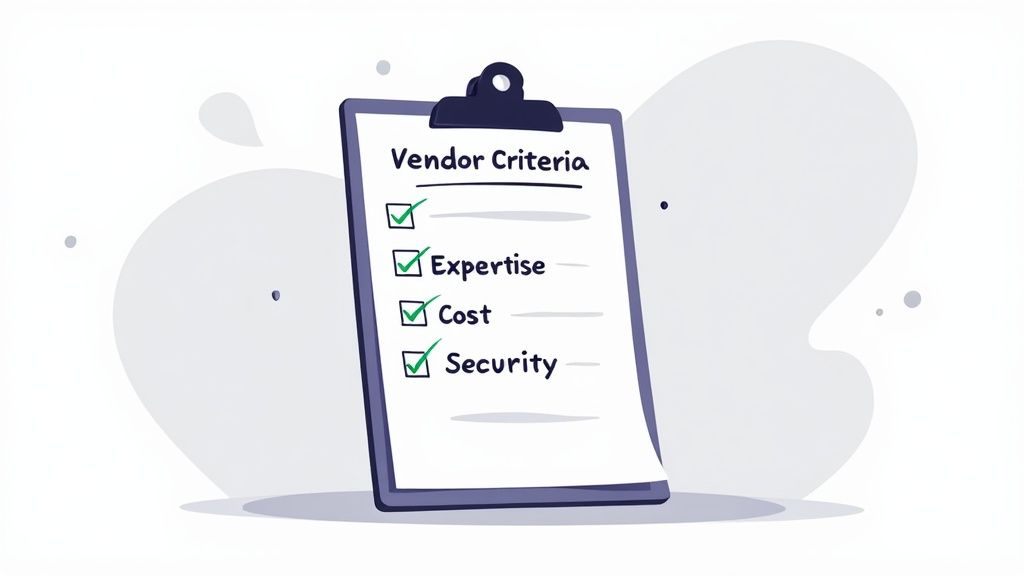
 16 minutes read
16 minutes read
Let's get one thing straight. For a long time, 'legal help' for a startup or a growing firm meant one of two things: hiring an eye-wateringly expensive law firm or trying to decipher dense legal jargon yourself at 2 AM. I’ve been there. You're trying to build a business, not become a part-time paralegal.
This is where outsourcing legal services flips the script. And no, it's no longer some secret weapon reserved for mega-corps. It’s about getting sharp, specialized legal support without paying for a partner's golf membership or the marble lobby their office sits in.

The old playbook? It’s broken. It forces you into a corner where you either overpay for basic tasks or risk a costly, amateur mistake by DIY-ing it. Outsourcing smashes that model. This isn’t about finding the cheapest option; it's about finding the smartest. It’s about efficiency, expertise, and frankly, your sanity.
And this isn't some niche trend. The global Legal Process Outsourcing (LPO) market hit $15.3 billion in 2023. That’s projected to rocket to over $132.6 billion by 2033. Why? Because a lot of smart people are catching on. You can explore more LPO market trends if you want to see the numbers for yourself.
Let's cut the corporate jargon. Outsourcing means you can actually get work done without watching your burn rate spiral out of control. It’s your secret weapon for moving fast and staying protected.

The goal isn't just saving a few bucks on an invoice. It's reclaiming your most valuable asset: time. Time you can spend on strategy, clients, and growth—not drowning in paperwork.
Here’s the real gain:
This guide is about making outsourcing legal services work for you—pragmatically and powerfully. Let's get into it.
Handing over legal work can make even the most seasoned founder nervous. It’s natural to wonder, "Am I giving away the keys to the kingdom?" The short answer is no—not if you’re smart about it.
This isn't about shipping your company's core litigation strategy to a stranger. It's about being strategic. We're talking about the high-volume, process-heavy tasks that quietly eat your budget, your team's time, and your will to live. It's about delegating the repeatable work to specialists who can do it faster, better, and cheaper.
Think of your legal operations in two buckets. One bucket holds your core genius: high-level strategy, critical client relationships, the stuff that actually makes you money. The other bucket holds everything else.
That second bucket? That’s outsourcing’s sweet spot.
This chart drives the point home. It’s not fuzzy feelings; it’s about bottom-line gains.

As you can see, the biggest motivators are what you'd expect: serious cost savings and freeing up your internal team. It’s a pure efficiency play.
Once you get comfortable, you'll see outsourcing is more than just clearing a backlog. It's about bringing in specialized expertise on a fractional basis—a true game-changer.

The real win isn’t just offloading tasks you hate. It's gaining access to skills you could never afford to hire full-time.
Think about these other high-impact areas:
Deciding what stays and what goes is critical. The table below offers a straightforward way to think about it.
Here’s a pragmatic look at which tasks to hoard and which to hand off.
| Legal Task | Keep In-House (And Why) | Prime for Outsourcing (And Why) |
|---|---|---|
| Core Business Strategy | Your Secret Sauce: This is your company's DNA. It's too integral to your identity to hand off to anyone. | Not Suitable: External partners just don't have the deep institutional knowledge for these calls. Don't even think about it. |
| High-Stakes Litigation | Direct Oversight is Key: You need your core leadership team in the trenches daily for the big, company-defining battles. | Support Tasks: E-discovery, legal research, and document management within the case are perfect for outsourcing. |
| Complex M&A Deals | Deep Company Knowledge Needed: The lead counsel must understand the intricate financial and cultural details of the business. | Due Diligence Support: Outsourced teams can chew through the massive document review and data room management. |
| Standard Contract Review | Potentially, for high-volume: If you have a dedicated in-house team, fine. But it's often a waste of a General Counsel's time. | Ideal for Efficiency: For NDAs and vendor agreements, this is a no-brainer. It's a high-volume, low-risk task. |
| Intellectual Property Filing | Strategic Decisions: Deciding what to patent or trademark stays in-house, tied to your product roadmap. | Process-Driven Execution: The actual filing, docketing, and maintenance are administrative and perfect for a specialized external team. |
| Legal Research | Quick, Strategic Questions: When you need a fast answer to guide a critical decision, your in-house lawyer is best. | Deep Dives & Memos: Comprehensive research projects are ideal for an outsourced specialist who can focus without interruption. |
This isn't about rigid rules. It’s a framework for smart decisions. You keep the high-level thinking; you delegate the high-volume execution.
Ultimately, outsourcing isn't about replacing your team; it's about reinforcing it. It’s about building a more agile legal function so your top talent can focus on what they do best.
So, you're sold on the idea. Great. Now for the fun part: figuring out how. This isn't a one-size-fits-all game. Choosing the right model is like picking a co-founder—it depends on your needs, your budget, and how much sleep you want to lose.
Let’s break down the good, the bad, and the occasionally frustrating.

First up: onshore outsourcing. Hiring legal experts in your own country. Think of it as the premium, white-glove service.
The big win is familiarity. They get the local laws, the regulations, the cultural nuances. No time-zone gymnastics, no misinterpretations. It feels like working with someone in the next office.
Of course, that convenience comes at a price. Onshoring is the most expensive option by a mile. You’re tapping into the same high-cost talent pool you were trying to escape. It’s a solid choice for hyper-sensitive work, but for most routine tasks, it’s like using a sledgehammer to crack a nut.
Next, the one that usually comes to mind first: offshore outsourcing. Tapping into global talent pools in countries with lower operational costs. For process-heavy work, this model is an absolute game-changer.
The primary driver? Cost. We’re talking massive savings that can fundamentally change your burn rate. Suddenly, tasks like document review and contract management become dramatically more affordable. This is a genuine strategic advantage.
And this isn't some small-firm hack. A staggering 81% of General Counsel report their internal teams are stretched too thin, leading them to outsource nearly 40% of their legal work. The offshore market is exploding for a reason.
The trade-off? You just need to be more deliberate. Vetting your provider is critical. For a deeper dive, check out this comprehensive guide to outsourcing legal services.
Finally, my personal favorite: the hybrid model. I call this the Goldilocks solution because, when done right, it’s just right.
Here’s the setup: you keep a senior, strategic lawyer on your side to handle the high-level thinking. They manage the strategy and make the critical judgment calls.
Then, you build a trusted offshore team to handle the execution. That senior lawyer directs the offshore team, delegating the high-volume document review, research, and drafting.

This approach gives you the strategic oversight of an onshore expert with the cost-efficiency and scale of an offshore team. You get the brain without paying for all the hands.
This blended team feels like a natural extension of your own. For most growing businesses and law firms, this isn't just an option; it's the smartest way to build a modern legal function.
Choosing a firm to handle your legal work feels like a high-stakes decision because it is. Get it right, and you’ve gained a massive competitive edge. Get it wrong? You're left with a costly, time-consuming mess.
So how do you separate the real experts from the pretenders?
Forget the slick brochures. I’ve been down this road, and I can tell you the difference between a simple "provider" and a true "partner" is night and day. A provider completes tasks. A partner invests in your success.

Here's my battle-tested checklist.
Let’s start with the absolute must-haves. If a potential firm can't check these boxes, the conversation is over.
Okay, so they passed the technical quiz. Now for the part that really matters. The human element.

A great outsourcing partner doesn't just take orders; they ask smart questions. They anticipate your needs. They become a seamless extension of your team, not just a line item on an expense report.
This is what I look for to see if we'll actually click.
Finding the right team is about building an asset. For ongoing support, exploring specialized solutions like virtual paralegal services can be a great way to access vetted pros. Ultimately, you're looking for a team that makes your life easier, not harder.
Let’s be honest. The conversation about outsourcing legal work almost always starts with money. The savings are big, they're immediate, and they're what get people in the door.
But if you stop there, you’re missing the point. The real transformation happens when your best people get their time back. Imagine your senior associate no longer bogged down by contract reviews. Instead, she’s architecting the strategy that wins the big case.
That’s when outsourcing shifts from a line item to a powerful operational advantage.
One of the biggest perks is tapping into specialized expertise you'd never hire full-time. Does your firm really need a dedicated data privacy expert on staff year-round? Probably not. But when a complex GDPR issue lands on your desk, having that expert a phone call away is a game-changer.
Think of it like having a bench of specialists:
You're not just handing off tasks; you're accessing a deep well of knowledge, and you only pay for it when you need it. It’s how you punch above your weight.
Remember the last time a massive lawsuit landed on your plate? The whole team pulled all-nighters, fueled by caffeine and sheer panic. The old model gives you two bad options: hire permanent staff you won’t need in six months or burn out your current team.
Outsourcing is the third, much smarter path: on-demand scalability.

The real power move is the ability to double your legal horsepower for a project without the drag of hiring, onboarding, and eventual offboarding. All the productivity, none of the long-term baggage.
This agility is what sets modern firms apart. It lets you take on bigger projects with confidence. A wide array of legal outsourcing services are built for exactly this kind of surge.
The data backs this up. An ALM Intelligence study found that firms using LPO see a 30% improvement in case turnaround times and a 25% jump in client satisfaction. It’s not just about saving a few bucks; it's about delivering better, faster results. That's why top LPO companies are leading the way and managing millions of legal transactions.
Stop thinking of outsourcing as just a cost-cutting tactic. Start seeing it as a strategic weapon. Yes, you'll save money. But the real win is building a more resilient, efficient, and formidable legal operation.
Alright, let's tackle the questions that are probably running through your head. When I first looked into this, I had the same ones. Here are the straight-up answers.
Short answer: yes, but it all depends on your partner. A top-tier provider likely has more robust security than your own firm. For them, data security isn't just a feature; it's their entire business. A single breach could be an extinction-level event, so they take it incredibly seriously.
When vetting partners, grill them on security. Ask about SOC 2 or ISO 27001 compliance. See how they handle GDPR and CCPA. A legitimate outfit will have these answers ready. If they get cagey, it's a huge red flag.

The key is to get everything in writing. A comprehensive NDA is non-negotiable. So is a service-level agreement (SLA) that clearly defines their responsibilities. The best providers are just as paranoid about your data as you are.
One of the best parts about outsourcing is escaping the tyranny of the billable hour. Most providers offer more predictable pricing models, which makes budgeting a dream.
You'll generally find a few options:
No matter the model, always demand a detailed cost breakdown. The goal is clarity and predictability.
I’ve seen some painful mistakes. Learn from them. The biggest pitfalls usually stem from having the wrong approach.
Mistake #1: The Race to the Bottom. Choosing a provider based solely on the lowest price is a trap. You get what you pay for. Cutting corners on quality will cost you far more in the long run.
Mistake #2: Terrible Instructions. Your outsourced team isn't psychic. If you provide vague, incomplete instructions, don’t be surprised by a subpar result. Invest the time upfront to be crystal clear about your expectations.
Mistake #3: Treating Them Like Vending Machines. Don't just send tickets to a faceless vendor. They are an extension of your team. Integrate them. Schedule check-ins. Provide feedback. The more they understand your goals, the more valuable they become. Treat them like a partner, and they’ll start acting like one.
Ready to stop drowning in paperwork and start focusing on what matters? HireParalegals gives you on-demand access to a curated network of over 10,000 pre-vetted legal professionals. Cut your payroll costs by up to 80% and find your perfect match in as little as 24 hours. See the candidates and transform your practice today.